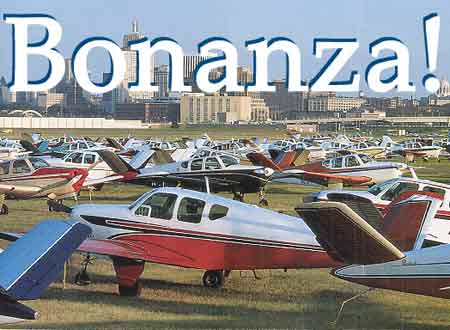
PAGE FOUR
Model 33: Debonair/Straight Tailed Bonanzas
For nearly 15 years after it’s introduction, the Bonanza
had the high-speed, four-place market to itself. Then Piper
and Cessna did something unpardonable: they designed competing
airplanes. The Commache may not have been as fast or as luxurious
as a Bonanza and the same thing could be said for the new
Cessna 210, but both airplanes came close and they were much,
much cheaper. Beechcraft responded by designing an airplane
that was supposed to be a bargain basement Bonanza that could
beat those upstarts on their own ground. The new airplane
was the Model 33 and was dubbed the Debonair. In this case,
the name, in addition to having a bouncy, elegant sound,
actually was a term that went back to French falconers and
meant “...to be of good air,” which was term for
a really oustanding Falcon.
When designing the airplane they wanted to make it very un-Bonanza-like,
so it recieved a straight tail, which was actually nothing
but the same “V” tail, flattened out with a rudder
and fin added. The interior would be Spartan, by Beechcraft
standards, and so much equipment would be optional, that
you even had to pay extra for a second hand on the altimeter.
The best laid plans of mice and marketeers sometimes go down
the tubes and, when the Debonair debuted in November of 1959,
buyers weren’t exactly pounding on Beechcraft’s
door. It was still more expensive than the competition, and
it lacked that Beechcraft look and feel that the Beech audience
had come to expect. The result was that beginning almost
immediately, the company began putting more and more frills
on the airplane in an attempt to attract customers until
they realized they had closed most of the gap on the Bonanza
and dropped the Debonair name altogether in 1968. Well, it
seemed like a good idea at the time.
Model 33 Debonair -1960
Beechcraft had Continental produce a special version of the
venerable I0-470 that put out 225 horsepower but burned 80/87
octane fuel and turned a Hartzell constant speed, two-blade
prop. The airframe was simplified in a lot of minor areas
such as eliminating the cowl flaps and using normal push-pull
controls in place of the vernier throttle and mixture. They
even went so far as to replacing the 6.50 x 6” tires
of the Bonanza with 6.00 x 6”.
Model Year Prices Speed
Debonair 33 1960 $58,000 161
Debonair A33 - 1961
Beechcraft must have been asking themselves “What can
we add to the airplane that will make it more attractive?,” as
the cosmetic changes began before the Debonair was a year
old. Among other things, the A33 introduced a fancier paint
job, a hat shelf and a cute little fold down armrest for
the front seats. Realizing they’d gone too far in simplifying
the airplane, they put a complete ventilation and exhaust
air system in it.
Model Year Prices Speed
A33 1961 $63,000 161
Debonair B33 - 1962
Parroting similar changes happening on the Bonanza at the
time, the Debonair received the leading edge fuel tanks
which, along with the optional aux tanks, reduced the number
of tanks from four to two. The airplane also received the
new P35 Bonanza instrument panel which included full-time
fuel gauges for each tank, rather than a selector switch.
| Model | Year | Prices | Speed, knots |
| B33 | 1962 | $63,000 | 161 |
| 1963 | $65,000 | 161 | |
| 1964 | $67,000 | 161 |
Debonair C33 - 1965
Yet another step towards Bonanzaizing the Debonair came when
they began offering the long rear window. At the same time
they increased the size of the dorsal fin which made the
longitudinal stability of an already stable airplane even
better. Among other interior changes, the bench seat in
the rear was replaced by individually adjustable bucket
seats.
| Model | Year | Prices | Speed, knots |
| C33 | 1965 | $69,000 | 161 |
| 1966 | $71,000 | 161 | |
| 1967 | $73,000 | 161 |
Debonair C33A - 1966
The sczhetsophrenia (SPELLING??) reach all time highs when
Beech offered the 285 hp IO-520 of the Bonanza as an option
in the Debonair. Now they had a 200 mph airplane that was
equipped like a Bonanza, went like a Bonanza and smelled
like a Bonanza. So, what the hell, they decided, next year
we’ll call it a Bonanza, which made the 1966/67 Debonair,
the last to carry that name.
| Model | Year | Prices | Speed, knots |
| C33A | 1966 | $82,000 | 174 |
| 1967 | $85,000 | 174 |
Bonanza E33 - 1968
Although they dropped the name “Debonair”,
they held on to the 225 hp engine and continued to make the
285 hp version an option designated by the suffix “A.” At
the same time they extended the windshield, giving it a greater
slope and made the longer third window standard equipment,
rather than an option.
| Model | Year | Prices | Speed, knots |
| E33 | 1968 | $85,000 | 161 |
| E33A | 1968 | $94,000 | 174 |
| E33 | 1969 | $87,500 | 161 |
Bonanza E33C Aerobatic Bonanza-1968
Talk about daring moves! Beechcraft decided to certify the
285 hp E33A in the aerobatic category and call it the E33C.
Further, when designing the airplane for akro, they didn’t
play around as the airplane was certified for just about
all inside aerobatic maneuvers including snap rolls and
momentary inverted flight which allowed true slow rolls.
What a kick! A total of 25 were produced.
| Model | Year | Prices | Speed, knots |
| E33C | 1968 | $121,000 | 174 |
| E33C | 1969 | $124,000 | 174 |